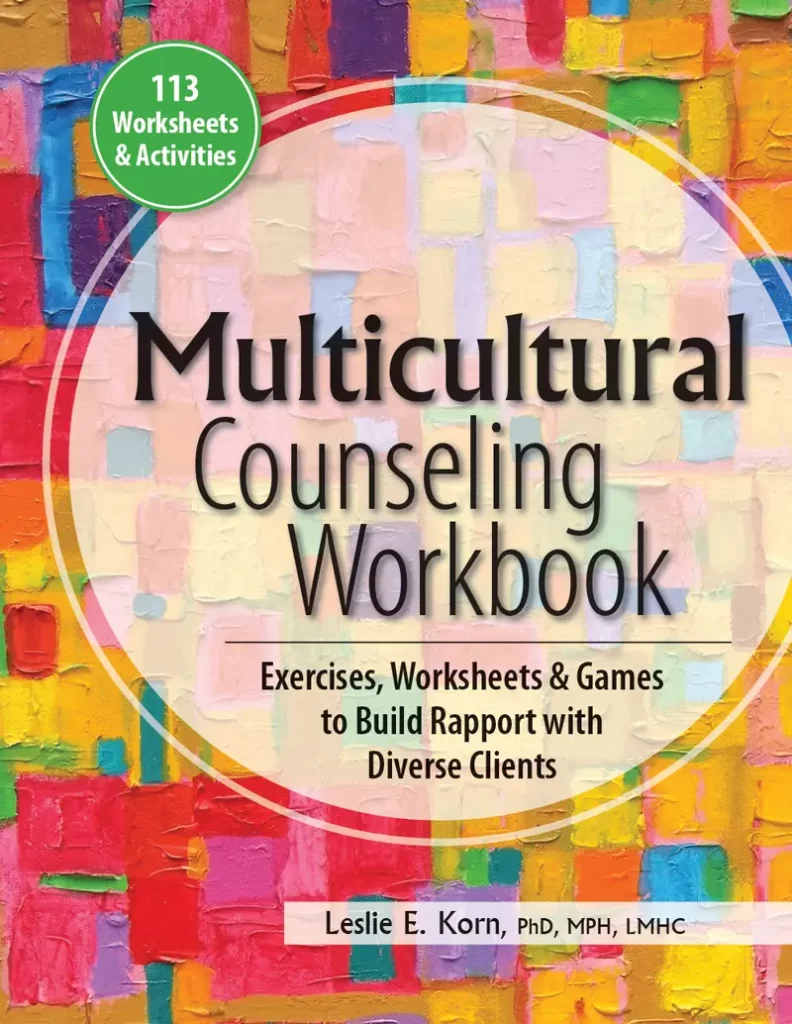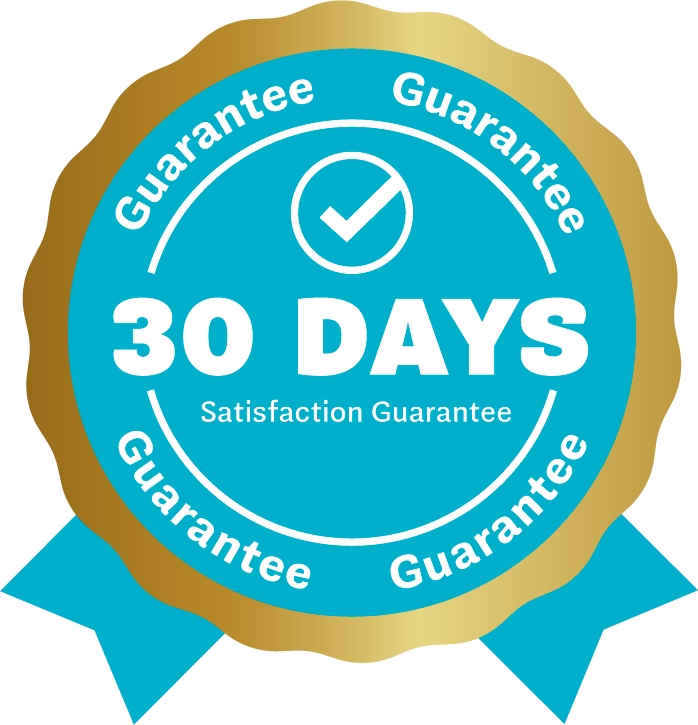
Multicultural Counseling Workbook: Exercises, Worksheets & Games to Build Rapport with Diverse Clients
Cultural competency begins with knowing who you are. Interactive, engaging and fun — this workbook is filled with valuable exercises, worksheets, games and clinical strategies to help you become more culturally competent.
Use this powerful workbook to explore cultural communities, religion, spirituality, gender, sexuality and disability. You’ll find unique activities to help you reflect on your own attitudes, prejudices, and develop new skills for working with and building rapport with diverse clients. This book includes group discussion questions, client worksheets, multimedia resources, strategies for client engagement, mindfulness & meditation activities, therapist worksheets, exercises and case vignettes.
Get Your Copy of the Multicultural Counseling Workbook
What This Book Will Teach You
- Explore more deeply about your own identity and how to use it to achieve results in therapy
- Use traditional medicines, foods, herbs, and rituals to establish deeper rapport with your clients
- Develop rituals with children using diverse arts
- Assess across cultures ethnicities and identities
- Deconstruct myths about diverse communities
- Use mindfulness
- Work comfortably across diverse religions
- Work across diverse gender and sexual identities
- Address abilities and disabilities with your clients
And much more…
Praise
“As a university faculty member and clinical practitioner, I think Dr. Korn’s book is a wonderful, comprehensive and much needed resource for cultural competency development. The narrative assists the reader in the exploration of one’s personal cultural self-awareness and helps the acquisition of new skills. I found this workbook to be the best multicultural counseling field guide I’ve read in many years.”

Dinah Manns, EdD
Research Lead, Faculty, Human Behavior-Counseling Studies, Capella University, Minneapolis, MN
“An impressive, highly accessible workbook on diversity and rapport building.”

John Ludgate, PhD
Author, Psychologist, Fellow of the Academy of Cognitive Therapy
“The importance of multicultural competency in our conflict-ridden world can’t be overstated. It is in everyone’s best interest. But the work involved in disentangling one’s prejudices is intense, and this book is here to help.”

Estelle Disch, PhD
Professor Emerita of Sociology, University of Massachusetts, Boston
“I would recommend this workbook to mental health professionals seeking to increase their own as well as their client’s cultural knowledge and self-awareness.”

Lambers Fisher, MS, LMFT, MDIV
Approved Supervisor, Minnesota Board of Behavioral Health
“A gift to the field of mental health that will support culturally responsive professionals.”

Priscilla Sanville, PhD
Professor Emerita, Creative Arts in Learning and Social Justice Facilitator, Lesley University, Cambridge, MA
“A wise traditional birth attendant from Darfur once told that ‘knowledge is like a garden: if it is not cultivated, it cannot be harvested.’ Leslie’s workbook is an effective fertilizer to cultivate multicultural counseling in the garden of clinical knowledge. It’s a great resource for clinicians and healers to develop multicultural competencies and mindfulness to diversify their work.”

Janaka Jayawickrama, PhD
Lecturer and Community Care Practitioner, University of York, United Kingdom
“Dr. Korn’s Multicultural Counseling Workbook is challenging, innovative, thought-provoking, educative, and experiential. All the qualities you want in an engaging workbook. When families and nations struggle behind unconscious masks of prejudice and bias, all efforts to heal illusions are welcome. The book is a valuable tool for nurturing change.”

Joseph Randolph Bowers, PhD
Senior Counseling Psychotherapist: Cultural, Indigenous, Disability, and Mental Health Specialist, University of New England, Australia
Get Your Copy of the Multicultural Counseling Workbook


Let me tell you more about the book
“Cultural competency begins with knowing who you are.”
—Rudolph C. Ryser, PhD, Center for World Indigenous Studies
The United States population of more than 300 million includes individuals and groups from most of the world’s 243 countries and peoples along with more than 550 indigenous nations. Engaging the diversity of one’s country can be a challenge, but it can also be enriching while offering an expansive understanding of the world in which we live.
When we take a history or conduct an assessment, we are listening to someone’s story and often asking them to make meaning of the story; through words or bodily symptoms. Understanding the diversity of stories across cultures illumines our capacity to understand more deeply the meaning of our client’s stories.
But in order to do so we must first understand our own varied stories. While we often explore our psychological story, our family story or our somatic stories, we do not quite as often in our clinical training explore the role of our cultural stories in contributing to our identity as individual clinicians, healers, colleagues, and administrators. This book provides a door to that path of exploration.
This workbook is designed for use by mental health and physical health clinicians and therapists, who want to develop new skills, explore their own attitudes and prejudices that can get in the way of a fully engaged diverse clinical practice and to obtain information about other cultures, religions and gender/sexual orientation. Groups of practitioners who want to increase their skills, and apply new tools for themselves and their clients as part of group professional development may also find this book helpful.
I have designed many of these exercises to be conducted while sharing a potluck meal to deepen self-knowledge and, to share in a safe space, feelings and attitudes that can also be a barrier to deeper collegial connection.
I have included many exercises and worksheets for you to use by yourself or with colleagues. There are also many worksheets, exercises and games you can use directly with clients to build rapport and connection. These exercises convey knowledge and they are fun. They draw on the many the ways we communicate through words, our body and through the arts and games. For your convenience, you may download a PDF version of the handouts at go.pesi.com/multicultural
To illustrate techniques and methods for establishing connection between the clinician and clients with different cultural experiences I have selected some of the larger and a few of the smaller cultural and religious identities present in the U.S. population. I have included cultural identities from all of the populated continents and some of the islands. You will learn about these cultural identities and by so doing you will further develop competencies to understand best practices that can be useful for you engaging cultural identities not emphasized here.
I go into depth with some cultural identities such as Mexican, Native American, African American and Asian and emphasize less several other identities. The richness of cultures will become apparent to you as you enter into your own extended learning even as the exercises in this workbook give you practice. We will also explore religion, spirituality, gender, sexuality, and disabilities.
At the end of each chapter you will find a range of multimedia resources that will extend the concepts presented in the chapter.
When I work with groups of clinicians around the United States I usually divide the world into, (1) Persons rooted in a culture and, (2) Those who have not been schooled in their own culture or who have simply set aside their culture to adopt another way of life. I frequently hear people say, “Oh, I don’t know who I am, I’m just Heinz 57!”
While each of us may not initially comment on culture and ethnic identity with people who say they are from one or more Euro-American heritages, there may be many reasons to step up and name one’s heritage.
What might some of these reasons be? For one thing, naming one’s heritage gives one a sense of grounding and connection with family, ancestors, and history. Understanding one’s heritage also allows one to greet and understand other people and their family ties.
Understanding one’s personal cultural heritage sometimes has the interesting effect of explaining why a person prefers a particular climate, a place, and even why one prefers certain cuisines. Children taught to understand their cultural heritage are more ready to respect and understand the diversity in their social lives while learning from that diversity.
Knowing one’s heritage provides an opportunity to expand one’s own knowledge and appreciation of other cultures and to find a balance in life.
About Leslie Korn
Dr. Leslie Korn has had a bi-lingual and bi-country clinical practice since 1977. She has taught multicultural counseling at California Institute for Integral Studies, Capella University, and Lesley University. She has worked as director of research and education at cwis.org, an indigenous directed nonprofit since 1996.







